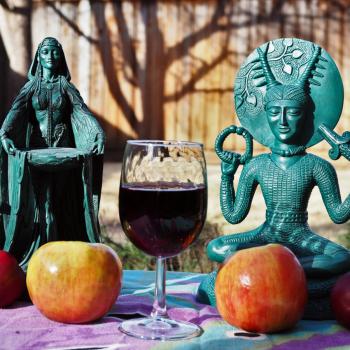You've written about relationship as well in your book on The Hunger Games. Instead of the Kingdom of God being about individual righteousness or salvation, you write in The Hunger Games and the Gospel that love for others is our essential spiritual calling. Can you talk a little about where you see that at work in the books and film?
Julie: In the biblical texts the original term for "righteousness" is the same as the word for "justice." Both are relational terms. To be righteous is to be justified to God and to others—to be in right relation with them. This is about something far more complex than just our individual relationship with God; it involves living in ways that show God's love to others around us. In The Hunger Games there is juxtaposition between those people who only care about their own safety or personal comfort and those who understand that they need to care for others—even those who may be their enemies.
We see this in Peeta's character when he risks a beating as a boy to feed Katniss' starving family, and when in the third book, Mockingjay, he risks even torture to warn the rebels of an impending attack. We also see this in Katniss' sacrifice when she takes her sister's place as Tribute for the Hunger Games and when she later chooses to join the rebellion to help Panem instead of running away to just care for her family. Jesus said the greatest commandments were to love God and love others, and we get a glimpse of what that can look like through the self-sacrificial examples of these characters in The Hunger Games.
Greg, you also write about the need to remember to love others in our political interactions, but lament that in our "winning is everything" culture we all too often dehumanize others instead. You suggest that we need to therefore start engaging in politics as Christians—what do you mean by that and what might that look like in our culture?
Greg: The ways Christians usually engage in politics—if they engage the public dimension of faith at all, since some people don't—are social conservatism or social justice, both of which have become connected to partisan politics. In Faithful Citizenship, I wanted to suggest we actually step back from binary arguments to righteousness or justice, as you've described it, and ask ourselves, what are the higher goods we're seeking?
If the higher goods we seek are love and compassion, as in the examples from The Hunger Games you cited, then what's the best way of seeking them in our public life together? My hope in writing Faithful Citizenship was that we could find a Christian political ethic centered around love instead of on imposing our will—or what we believe to be God's will—on the world. If God, in the person of Jesus, didn't impose God's will through power but through love and persuasion, that seems to me to be a model we might employ as well.
One last question for you now after having seen the movie version of The Hunger Games—and thanks for the chance to talk, Julie. Both of us have an interest in how the world might change, and it's reflected in both our new books, which is kind of cool. My screening of The Hunger Games was full of kids, as were theaters all over America. If you had your way, what would those kids take away from the film and into their lives? How might the story of Katniss, Gale, Peeta, and the other characters change them and maybe even our culture?
Julie: I would love for The Hunger Games to help youth become aware of the very real suffering, hunger, and oppression in our own world. Such things don't just exist in movies and books, but are everyday realities for many people.
Sadly, in places like the United States we can become so distracted by entertainments and even political debates that we can fail to see the suffering of others, much less work to do anything about it. We eerily resemble the Capitol in those ways.
My hope is that The Hunger Games will force us to look at our own culture and start caring for others and not just ourselves. Thankfully, I am seeing The Hunger Games having at least a small effect in getting youth to start caring. I've seen groups tap into The Hunger Games fanbase to get them to support causes that help end hunger and human trafficking. Katniss, Peeta, and Gale live in a world full of suffering and work hard to help create a better world for all-I hope that youth in our culture will follow their example.





